Chapter 6 Beginning of Freedom Movement
Textbook Questions and Answers
1. (A) Rewrite the statements by choosing the appropriate options:
Question 1.
The Servants of India Society was founded by
(a) Ganesh Vasudev Joshi
(b) Bhau Daji Lad
(c) M. G. Ranade
(d) Gopal Krishna Gokhale
Answer:
(d) Gopal Krishna Gokhale
Question 2.
The first session of Indian National Congress was held at
(a) Pune
(b) Mumbai
(c) Kolkata
(d) Lucknow
Answer:
(b) Mumbai
Question 3.
wrote Geeta Rahasya.
(a) Lokmanya Tilak
(b) Dadabhai Nowrojee
(c) Lala Lajpat Rai
(d) Bipinchandra Pal
Answer:
(a) Lokmanya Tilak
B. Write the Names :
Question 1.
Moderate leaders
(i) ……… (ii) ………
Answer:
(i) Gopal Krishna Gokhale
(ii) Ferozshah Mehta
Question 2.
Extremist leaders
(i) ……. (ii)………..
Answer:
(i) Lokmanya Tilak
(ii) Lala Lajpat Rai
2. Explain the following statements with reasons:
Question 1.
In the struggle for Independence, a sense of identity was awakened among the Indians.
Answer:
- Western education familiarised the educated Indians with modern values such as liberty, equality, democracy and nationalism.
- The Asiatic Society at Bengal edited and published hundreds of manuscripts in Sanskrit, Persian and other Indian languages.
- The realization that India had a rich ancient heritage aroused the feeling of national pride. This gave a sense of identity to Indians.
Question 2.
Two groups were formed in the Congress.
Answer:
1. Though at a slow pace, the contribution of Indian National Congress was consistent in the initial stage. But the extremists felt to intensify the freedom struggle.
2. Moderates and Extremists were unanimous about the objectives of Congress. But they had differences regarding the methods/ways to achieve it.
3. The moderates insisted on constitutional measures whereas extremists wanted to adopt severe methods.
4. The tension between these groups increased during the Surat session in 1907.
This led to the formation of two groups within the Congress.
Question 3.
Lord Curzon decided to partition Bengal.
Answer:
1. Bengal was a large province. So under the pretext of administrative convenience, the province of Bengal was partitioned by Lord Curzon.
2. Accordingly, the Muslim-majority East Bengal and the Hindu-Majority West Bengal were created in 1905.
3. The real motive was to create a divide between the Hindus and the Muslims and thereby weaken the nationalist movement. The British used the Policy of ‘Divide and Rule’.
3. Write short notes:
Question 1.
Objectives of the Indian National Congress :
Answer:
The Indian National Congress was established in 1885 with the following objectives:
- To bring together the people of India on a common platform.
- To create a feeling of unity among them, irrespective of religion, race, language, geographical territories.
- To provide opportunities to understand one another’s problems and views.
- To increase the feeling of unity among the people.
- To take measures for the upliftment of the country.
Question 2.
Anti Partition Movement :
Answer:
- With the motive to create a divide between the Hindus and the Muslims, Lord Curzon divided the province of Bengal in the Muslim-majority East Bengal and the Hindu-majority West Bengal in 1905.
- The day of partition, 16th October was observed as the ‘National Mourning Day’.
- All over India, protest meetings were organised to condemn the decision of the government.
- Singing of Vande Mataram and Raksha-bandhan programmes were arranged to mark the protest.
- Government-run schools and colleges were boycotted in large number by the students.
- Sensing the intensity and severity of dissatisfaction the British annulled the Partition of Bengal.
Question 3.
Four Point Programme of the Indian National Congress :
Answer:
In the session of 1906 of the Indian National Congress, the four-point programme was unanimously accepted.
- Swadeshi: To make use of capital, resources, manpower in our country so that it becomes self-sufficient.
- Boycott: It was decided to boycott foreign goods as a first step, and boycott of foreign rule be the next step. It would be an attack on the roots of British imperialism.
- Swaraj: The final objective is to attain freedom.
- National Education: To impart education which will create pride for the nation among people.
4. Explain the background behind the establishment of Indian National Congress with the help of following points:
1. Centralisation of administration
2. Economic exploitation
3. Western education
4. Study of Ancient Indian History
5. Role of newspapers
Answer:
The background behind the establishment of the Indian National Congress in 1885:
1. Centralisation of administration :
- The uniform policies, identical reforms and equality before law brought the nation under one roof.
- The network of roads and railways brought the people of India together.
- It developed the feeling of unity among Indians.
2. Economic exploitation :
- The economic exploitation of India through the imperialistic policies led to the drain of the Indian wealth to England.
- Industries declined and the farmers became bankrupt.
- Imposition of taxes on middle class and the exploitation of worker class by the capitalist led to growth of discontent.
3. Western education :
- Western education familiarised the educated Indians with modern values and principles such as liberty, equality and democracy.
- They accepted principles like rationalism, humanity and nationalism.
- They realised that they can carry out work of the country by following them.
4. Study of Ancient Indian History :
- The manuscripts in Sanskrit, Persian and many other languages were examined and research was published.
- Many western Scholars started to study Indian culture.
- The realisation that India had a rich ancient heritage aroused the feeling of national pride among Indians.
5. Role of newspapers :
- Newspapers in English and vernacular languages carried articles criticising the policies of the government.
- It led to social and political awakening.
Do you Know?
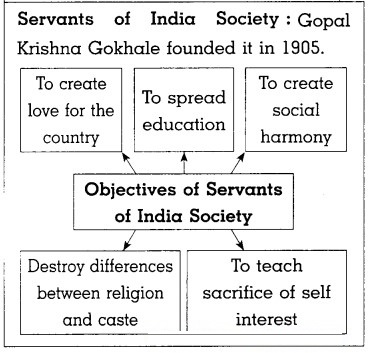
Project:
Collect additional information about the leaders of the early phase of Indian National Congress with the help of the internet.
Additional Important Questions and Answers
Rewrite the statements by choosing the appropriate options:
Question 1.
…………. newspaper was a mouthpiece of extremist ideology in Bengal.
(a) Dnyanoday
(b) Dnyanprakash
(c) Amrit Bazar Patrika
(d) Kesari
Answer:
(c) Amrit Bazar Patrika
Question 2.
………….. declared to give responsible political system to India.
(a) Montague
(b) Morley
(c) Dalhousie
(d) Chelmsford
Answer:
(a) Montague
Question 3.
A committee under the leadership of met …………… Governor-General Lord Minto.
(a) Sir Sayyad Ahmad Khan
(b) Abdul Latif
(c) Baddrudin Tayyabji
(d) Aga Khan
Answer:
(d) Aga Khan
Question 4.
The Home Rule Movement was launched in …………. against Colonialism.
(a) South Africa
(b) Ireland
(c) Scotland
(d) Switzerland
Answer:
(b) Ireland
Question 5.
…………… was established in 1906.
(a) The Indian National Congress
(b) Moderate Party
(c) Extremist Party
(d) The Muslim League
Answer:
(d) The Muslim League
Identify the wrong pair and correct it:
(1) The first President of Indian National Congress
– Wyomesh Chandra Banerjee
(2) Assassinated Rand
– The Chapekhar Brothers
(3) He pronounced the word Swaraj for the first time
– Lokmanya Tilak
(4) The British officer who took initiative in forming the Indian National Congress.
– Allen Octavian Hume
Answer:
Wrong Pair: He pronounced the word Swaraj for the first time.
– Lokmanya Tilak
Corrected pair: He pronounced the word Swaraj for the first time
– Dadabhai Nowrojee.
Write the Names:
Question 1.
They studied ancient Indian culture
(i) ……… (ii) …….
Answer:
(i) Dr. Bhau Daji Lad
(ii) Dr. R.G. Bhandarkar
Question 2.
Leaders of Home Rule Movement
(i)……… (ii) ……
Answer:
(i) Dr. Annie Besant
(ii) Lokmanya Tilak.
Answer the following questions in one sentence each:
Question 1.
Which institute was established to study ancient Indian culture?
Answer:
The Asiatic Society was established in Bengal to study ancient Indian culture.
Question 2.
Which were the mediums initially used by the extremist leaders to create political awakening?
Answer:
The extremist leaders initially used the mediums of newspapers, national education and national festivals.
Question 3.
What was the objective of the extremist leaders in founding the educational institutions?
Answer:
The extremist leaders established educational institutions for creating a generation which will have concern for their own language and tradition.
Question 4.
Who led the Anti Partition Movement?
Answer:
Surendranath Banerjee, Anand Mohan Bose, Rabindranath Tagore and such other leaders led the Anti-Partition Movement.
Question 5.
How did Tilak criticise the Montague-Chelmsford Act?
Answer:
Lokmanya Tilak criticised the Moptague-Chelmsford Act in the following words, “This is neither Swaraj nor its foundation.”
Question 6.
What did Lokmanya Tilak firmly state?
Answer: Lokmanya firmly stated that “Swaraj is my birthright and I shall have it.”
Complete the graphical presentation:
Question 1.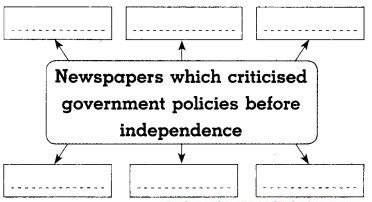
Answer: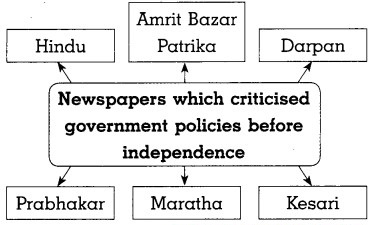
Question 2.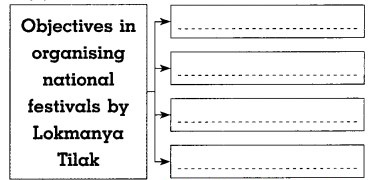
Answer: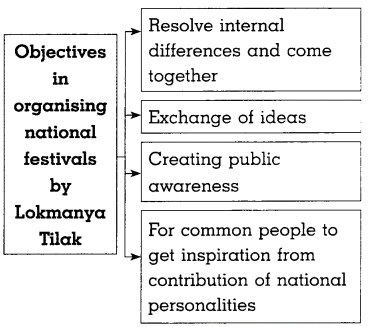
Answer: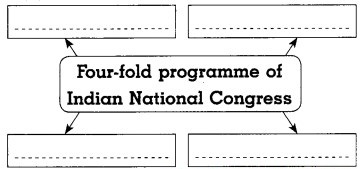
Question 3.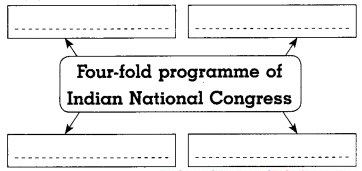
Answer:
Explain the Concept :
Question 1.
Moderates :
Answer:
- The Moderates were the leaders who wanted to carry out nationalistic movement within the constitutional methods and peaceful meAnswer:
- The leaders were realistic and highly educated and had faith in the justice of the British.
- They had hope that if they place their demands in constitutional manner the British will give justice to their demands.
- They were aware that a strong foundation needs to be built through organised work.
- The philosophy and principles of western thinkers like liberalism, freedom, equality, fraternity influenced them.
Question 2.
Extremists :
Answer:
- The leaders of the Indian National Congress who advocated intensification of the struggle to attain freedom were known as Extremists.
- Moderates and Extremists were unanimous about the objectives of Congress. The Extremists had no faith in the constitutional methods of the Moderates.
- According to Extremists, freedom will be attained only if lakhs of people participated in the freedom movement and challenge the British government.
Write short notes :
Question 1.
First session of Indian National Congress :
Answer:
- The founding session of the Indian National Congress took place on 28th December, 1885 at Gokuldas Tejpal Sanskrit school in Mumbai.
- It was presided by Wyomesh Chandra Banerjee, a renowned lawyer from Kolkata.
- It was attended by seventy-two delegates from different provinces of India.
- Allen Oct avian Hume took the initiative in establishing of the Indian National Congress.
- Increase in the number of Indians in the administration, reduction in military expenditure were the demands placed before the British government.
Question 2.
Servants of India Society :
Answer:
1. Gopal Krishna Gokhale founded the Servants of India Society in 1905.
2. Its main objectives were :
- to create love for the county.
- teach them sacrifice of self-interest.
- no differentiation on the basis of caste and religion.
- to create social harmony.
- to spread education.
Question 3.
The Lucknow Pact :
Answer:
- An attempt was made under the leadership of Lokmanya Tilak to resolve differences in the Indian National Congress at its Lucknow session in 1916.
- In the same year, there was an agreement between Indian National Congress and the Muslim League, known as the Lucknow Pact.
- According to this Pact, Indian National Congress agreed to separate electorate for Muslims.
- In return, the Muslim League agreed to support the Indian National Congress in its work for getting political rights to India.
Question 4.
Home Rule Movement :
Answer:
- Home rule means self-rule or self-government.
- It was modelled after the Home Rule Movement in Ireland.
- It was led by Dr. Annie Besant and Lokmanya Tilak.
- They made extensive tours in different parts of the country so that the demand of self-government could reach the common people.
Explain the following statements with reasons:
Question 1.
A feeling of nationalism developed among the IndiAnswer:
Answer:
- The British established a centralised administration in India and applied uniform policies all over the country.
- They also laid down the principle of equality before law.
- They introduced the modern means of transport and communication.
- It benefited Indians as well. This made possible for the people living in different parts of India to establish contact with one another. This factors developed a feeling of nationalism among the Indians.
Question 2.
Lokmanya was imprisoned in 1897.
Answer:
- In 1897, hundreds of people died in Pune due to the epidemic of Plague.
- An officer name Rand was appointed to bring the epidemic under control.
- He started a search campaign to find Plague patients and adopted oppressive measures.
- To avenge this cruel and oppressive treatment meted out to people, the Chapekar brothers assassinated him.
- An unsuccessful attempt was made by the government to connect Lokmanya Tilak with this conspiracy.
- When they failed in their attempt, they imprisoned him with revenge.
Question 3.
The National Congress split at its Surat session in 1907.
Answer:
- The differences between the moderates and the extremists reached a climax in 1907.
- The moderates wanted to keep aside the resolution of Swadeshi and Boycott which was thwarted by the extremists.
- Some moderate leaders blamed the extremist leaders for trying to capture the Indian National Congress.
- It became impossible to arrive at a compromise between both the groups. As a result the Indian National Congress split at its Surat session in 1907.
Question 4.
The charge of sedition was put on Lokmanya Tilak.
Answer:
- There was wide protest against the partition of Bengal throughout the country.
- With a view to restrain the anti¬partition movements government resorted to many suppressive measures.
- Strict action was taken against extremists leaders which caused severe reactions in Bengal.
- The revolutionaries adopted means of firing and bomb blasts which was advocated by Lokmanya Tilak through his newspaper Kesari.
Therefore, the charge of sedition was put on Lokmanya Tilak by the British government for which he was sent to Mandalay jail for 6 years.
Question 5.
The government passed the Morley- Minto Act.
Answer:
1. The economic policies of the British increased poverty in India.
2. It created dissatisfaction in the minds of the people against British rule.
3. The oppressive measures adopted by Lord Curzon to suppress the protest of partition of Bengal, exclusion of educated Indians in government services and the unjust treatment towards Indians in Africa all this added to the dissatisfaction among the IndiAnswer:
4. Morley-Minto reforms were passed by the British government as a temporary remedy to calm discontent among the IndiAnswer:
Question 6.
The Montague-Chelmsford Act disappointed the people of India.
Answer:
The Montague-Chelmsford Act disappointed the people of India, because
- The British Government had declared its intention to gradually grant the right to self-rule and responsible government in 1917.
- In 1919, the British Parliament passed an act to bring constitutional reforms in India.
- According to the Act, less important departments were transferred to Indian ministers and important departments like Finance, Home affairs and Revenue was kept with the Governor.
- Thus, it belied the hope that the Act would lay foundation of responsible government in India and disappointed the people.
Answer the following questions in 25-30 words:
Question 1.
What realisation led to the emergence of a political organisation on all India level?
Answer:
- English educated Indians were instrumental to bring about Renaissance.
- They launched reform movements in social, political, religious, economic and cultural field in different parts of the country.
- The political organisations in different parts of the country formed during various movements felt the need to create a political organisation on an all India level having common goal.
- It was necessary to bring together groups and people who had political awareness.
- It was necessary to draw attention of the people towards questions of the nation. This led to the emergence of a political organization on all India level.
Question 2.
State the impact of imperialistic policy of the British on India.
Answer:
- The economic exploitation of India through the imperialistic policies led to the drain of the Indian wealth to England.
- The compulsion to grow cash crops, burden of land taxes and recurring famines made conditions of farmers miserable. All these broke the backbone of the Indian agriculture.
- With the decline of traditional industries, there was increase in unemployment.
- The workers were exploited by the capitalists.
- The middle class suffered due to imposition of various new taxes.
This was the impact of the British imperialist policy which led to discontent among the IndiAnswer:
Question 3.
State the impact of western education?
Answer:
- Due to spread of western education, new ideas like Justice, Liberty, Equality, Democracy, etc. were introduced to the IndiAnswer:
- The young Indians imbibed the values like rationalism, humanity, nationalism and scientific attitude.
- They developed a feeling that they could carry out the work of the country.
- English became the new medium of communication.
Question 4.
What message did Dadabhai Nowrojee give at the session of Congress in 1906?
Answer:
At the session of the Indian National Congress in 1906, Dadabhai Nowrojee pronounced the word ‘Swaraj’ for the first time. He gave the message
- to remain united.
- try sincerely and fulfill the aim of Swaraj so that those who are poor, hungry and having diseases could be saved,
- India to get respectable position among the developed countries.
Question 5.
Write about the process of formation of Muslim League.
Answer:
- The British got very disturbed by the overwhelming public response to the Indian National Congress in the anti-partition movement.
- They once again resorted to the policy of ‘Divide and rule’.
- Many British officers suggested that a separate political organisation was necessary to safeguard the interests of the Muslims.
- Due to motivation of British government, under the leadership of Aga Khan a committee of upper-class Muslims met Governor-General Lord Minto.
- Thus, encouraged by Lord Minto and other British officers, the Muslim League was formed in 1906.
Question 6.
What were the provisions of Morley- Minto Act?
Answer:
1. The Morley-Minto Act of 1909 provided for increase of the number of Indian members in the legislatures and the inclusion of some elected Indian members.
2. It created separate electorates for the Indian Muslims.
Question 7.
What is Responsive Cooperation?
Answer:
1. India had to face the brunt of First World War which led to growing dissatisfaction among people.
2. To curb their dissatisfaction and get cooperation, Montague, the Secretary of State for India, declared in 1917 that Britain would gradually grant the right to self-rule and a responsible government to India. ,
3. Lokmanya Tilak declared that if the British Government showed sympathy and a considerate attitude to the demands of the people then the people of India would cooperate with the government. This is called ‘Responsive Cooperation’.
Write answer in details :
Question 1.
Give a brief account of the work of Extremist leaders in India’s freedom struggle.
Answer:
- Extremist leaders Lokmanya Tilak, Bipin Chandra Pal, Lala Lajpat Rai advocated intensification of the struggle since the British did not respond to the petitions and appeals.
- ) Initially, they used the mediums of newspapers, national festivals and national education to bring about political awakening.
- They formed educational institutions to sow the seeds of nationalism in society and to create a generation which will show concern about their language and tradition.
- Lokmanya Tilak severely criticised the suppressive policies or the British through the newspapers like ‘Kesari’ and ‘Maratha’.
- Lokmanya Tilak started Ganesh Utsav and Shiv Jayanti to bring people together.
- The leaders did not adopt the means of armed revolution but insisted on extensive agitations.
- Swaraj, Swadeshi, National Education and Boycott was the four-point ‘ programme accepted.
- The Moderates laid the foundation of freedom struggle and the Extremists carried it forward.
Question 3.
Which measures were taken by the : British government to suppress the Anti-Partition Movement?
Answer:
The British government adopted following measures to suppress the anti-partition movement:
- The public meetings were banned.
- Strict punishment was given to those who broke the law.
- Even school children were beaten up.
- Many restrictions were imposed on the newspapers.
- The British confiscated many printing/presses on false ground of criticising the ; government.
- Writers and editors were imprisoned.
- Strict actions were taken against many extremist leaders.
- Lokmanya Tilak was sent to Mandalay jail at Myanmar for 6 years on the charge of sedition.
- Bipin Chandra Pal was sent to jail and Lala Lajpat Rai was deported out of Punjab.
Identify the picture and write about his contribution to the freedom struggle.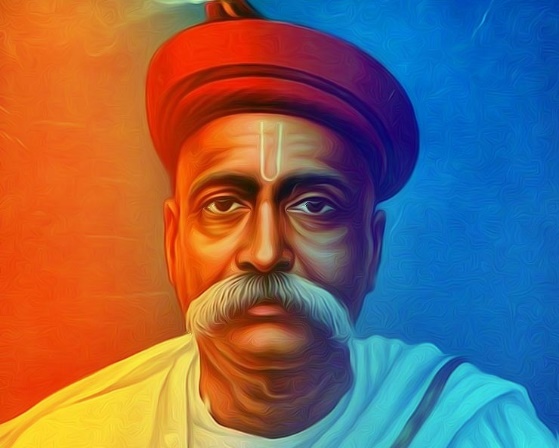
Answer:
- The Above picture is of Lokmanya Tilak.
- He started the newspapers Kesari and Maratha.
- He started festivals like Ganesh Utsav and Shiv Jayanti for people to come together and get inspiration from contribution of national personalities.
- The bomb attacks by the revolutionary was advocated through newspaper Kesari and Maratha.
- Due to this, he was charged with sedition and put in Mandalay jail for 6 years.
- When he was in Mandalay prison he wrote Geetarahasya which advocated philosophy of Karmayoga and stressed upon the people to always remain in action.
- An attempt was made under his leadership to resolve differences between two groups in the Indian National Congress in its session of 1916.
- He started the Home Rule Movement along with Dr. Annie Besant.
- He travelled in different parts of India so that the demand for self government reach the common man.
- He firmly declared, ‘Swaraj is my birth right and I shall have it.’
- He criticised the Montague Chelmsford Reform Act when it failed to fulfill the demand of responsible government.
Question 4.
Do you feel the four-fold programme implemented by Indian National Congress needs to be implemented even today? Why?
Answer:
In the pre-independence period, Indian National Congress implemented the four-fold programme of Swaraj, Swadeshi, Boycott and National education. The programme needs to be implemented today but with slight changes.
1. Swaraj: Today we have political freedom but we lack good Governance. Common man, farmer, women and the backward classes still suffer.
2. Swadeshi: In the world of Globalisation, goods from other countries have entered Indian markets. It is necessary for the Indian industries to implement programme of Swadeshi to sustain.
3. Boycott: It is not possible to boycott foreign goods but we should insist on indigenous goods wherever possible.
4. National education: Schools in India impart education catering to different needs and ideologies but they fall short to create national pride and imparting character training.
